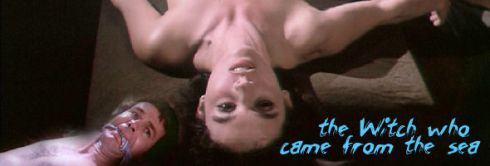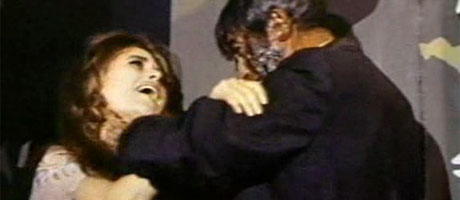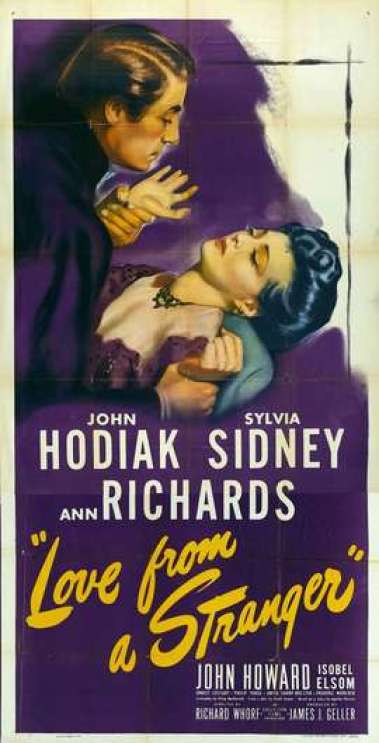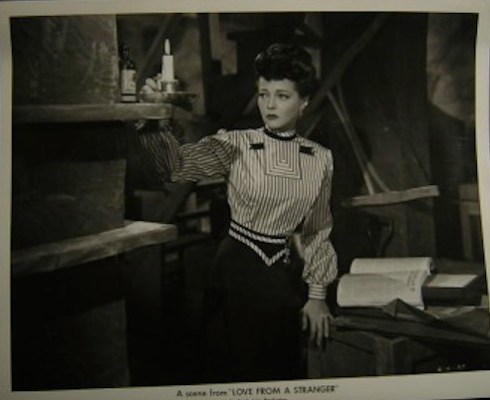Read Part Two here


"I am a ham! And the ham in an actor is what makes him interesting. The word is an insult only when it's used by an outsider – among actors, it's a very high compliment, indeed."

In the history of cinema, there are stars that burn white hot. Then there are those who wind up taking a detour – yet they've earned the vibrancy and a willingness to explore even the vast floor of the ocean's bottom – this is emblematic of a beloved cult B actor. Those who tickle us with a zeal for chills and chagrins, guffaws and gadzooks, individualism and inimitability, captivating and crapola!
In his later years, John Carradine would come to be known as one of these"¦ the crime is… he was a damn sensational actor!
"I never made big money in Hollywood. I was paid in hundreds, the stars got thousands. But I worked with some of the greatest directors in films and some of the greatest writers. They gave me the freedom to do what I can do best and that was gratifying."
In regards to his horror legacy, this is what he had to say in 1983 in an interview for KMOX tv:
“That’s the least of my work. I’ve done almost 400 films and only 25 have been horror.”
When you think of John Carradine you might recall his brilliant performance as Casy in The Grapes of Wrath. Carradine had worked with some of the most notable actors and directors in the history of cinema and by the end of his career, he also managed to plumb the depths with some of the crummiest.
Then again you might be excited by his translation of the Dracula mythos in five films: two from Universal’s finely tuned House of Frankenstein (1944), House of Dracula (1945), and three from the later decade’s trash heap – Billy the Kid Versus Dracula (1966), Vampire Hookers (1978), and Nocturna (1979).


On Bela Lugosi in 1956: "Lugosi was a craftsman. I've known him for 25 years. He was a considerate and kind gentleman. As for the parts we both played, he was the better vampire. He had a fine pair of eyes. Nobody will ever be able to fill his shoes. He will be missed by us all."
Like Whale's Frankenstein monster, Carradine actually missed out on playing the monster and the lead role in Dracula (1931).
With 354 film and television credits to his iconic career, John Carradine was known for his distinctively deep baritone voice and tall, thin frame, a "˜towering, craggy frame' which often earned him roles as villains and sinister characters, mad doctors, Draculas, hobos, drunks and a slew of nefarious Nazis devils!



At times he had the charm of a jaunty Grim Reaper. Even those smart pale blue eyes that flicker cannot be obscured by that quizzical squint.

William Beaudine on the set of The Face of Marble 1946.
He often worked with director John Ford but you've no doubt seen him playing a mad scientist in Captive Wild Woman 1943, The Face of Marble 1946, and The Unearthly 1957.
But one thing that links all these archetypes together is Carradine’s range of either an austere penetrating reserve or a flamboyant spirit framed by his willowy shape. Carradine can intone with either his whispering rumination from a well-written script or summoning his grandiose voice as he reads aloud the trashiest, tackiest dialogue that only he can make appear as a highfalutin soliloquy.
His nicknames were the Bard of the Boulevard and The Voice.

The Face of Marble (1946) An Odd John Carradine Obscurity with an “Identity Crisis”
Carradine's career includes significant Academy Award-worthy roles, but in contrast, once he started his descent into the madness of acting obscurity, he embodied figures of grotesques and unsavory types. Eventually, he appeared in films more like a drifter just passing through in overambitious garbage Z movies. And now, he will always be considered one of the big-time heavies of the horror genre.
Still, he has left behind a legacy of striking screen performances: the sinister Sgt. Rankin in The Prisoner of Shark Island, and the somber "Long Jack" of Captains Courageous. He played a melancholy Lincoln in Of Human Hearts, a treacherous Bob Ford in Jesse James, the curious stranger Hatfield of Stagecoach, and one of his greatest contributions to the acting craft, as earnest dispirited preacher Casy in The Grapes of Wrath. All masterful characters in Hollywood's golden age of filmmaking.



Carradine appeared in eight Oscar Best Picture nominees: Cleopatra (1934), Les Misèrables (1935), Captains Courageous (1937), Alexander's Ragtime Band (1938), Stagecoach (1939), The Grapes of Wrath (1940), The Ten Commandments (1956), and Around the World in 80 Days (1956). Only the last of these won.


He has appeared in eight films that have been selected for the National Film Registry by the Library of Congress as being “culturally, historically or aesthetically” significant: The Invisible Man (1933), The Bride of Frankenstein (1935), Stagecoach (1939), The Grapes of Wrath (1940), Johnny Guitar (1954), The Court Jester (1955), The Ten Commandments (1956) and The Man Who Shot Liberty Valance (1962).

Though he was known for his ability to bring a kiss of intensity and an air of mysteriousness to his characters, often cast in villainous and sinister roles – he was highly regarded for his versatility and range as an actor. Despite his status as a horror icon, Carradine was more than just a genre actor and never wanted to be known for his long involvement with horror pictures, as he called them.
He was transitional in all genres such as historical dramas, war and spy films, film noir, westerns, horror, sci-fi, mystery thrillers, and romantic comedies. His career ran the spectrum of storytelling.
Carradine was capable of serious dramatic reverie, and earnest and sober performances til ultimately – schlocky b movies, ‘The "˜Divine Madness' of this flamboyant, grand old man of the theater and Hollywood, Carradine's persona emerged as a confluence between the individualist and distinguished gentleman.’ (John Carradine: The Films edited by Gregory Willam Mank)

But after all this superior work in an industry that chewed up and spits out great actors, even after his contribution to the horror genre that once saw him as one of the ruling class in Universal's horror films such as House of Frankenstein and House of Dracula. There is a place for him amongst the aristocracy of Boris Karloff, Bela Lugosi, Christopher Lee, and Peter Cushing, though he might be considered the vagabond of the horror pantheon, as he will undoubtedly be remembered for his role in B horror and exploitation films.

"I have shot, strangled, or otherwise disposed of many a victim on the screen in my day. However, more mayhem has been committed on me than I ever committed on anyone else. I have been poisoned, drowned, shot, pushed off cliffs, hanged, strangled, electrocuted, and run over by subway trains."

John Carradine is a noble eccentric, a cult icon who enjoyed photography and painting, sang opera, loved sculpting, knew the Bard's work by heart, and could recite Shakespeare at every opportunity. Interviews and commentary from other people in the industry would relate stories of John Carradine getting potted with a drink in hand and spouting Shakespeare and funny anecdotes. "He had a repertoire of bad jokes and off-color reminiscence of Old Hollywood." He was famous for that as much as for his acting.
Carradine is known for his theatricalizing, his out-of-control drinking, and his private life which was a circus. A life bombarded with non-conformity, chaotic marital trials and tribulations, arrests for not paying alimony, drunk driving, prostitution scandals, and bankruptcy that left him destitute.
With all the disorder in Carradine's life, the reputation that the actor built from his earlier career took a ruinous insult over the years.
By the end, the actor didn't bother to read a script, he learned his part no matter how ridiculous yet he took anything that came his way so he could pay the rent, finance his dream of having his own theater company and support his boys.
"An opera cape, top hat, ebony stick, and glittering diamond studs set John apart in a town where a tuxedo is considered formal dress. At intermissions, he stands gracefully in the lobby, smoking a long Russian cigarette and twirling his cane"¦ It is the kind of exhibitionism that made Hollywood, in its colorful beginnings, the most talked about town on Earth"¦"

John Carradine with his actor sons, John, Keith, and Robert courtesy Getty Images date unknown.
Fred Olen Ray: "He was both a prince and a rascal" "¦" He was colorful and dramatic"¦ He had a sweeping, majestic personality and an extraordinary voice that somehow managed to make the worst dialogue sound good."
Keith Carradine: "Here was this Shakespearean actor who, in the 1950s to feed his children, did a lot of horror movies. That's mostly what he's known for. I think it sort of broke his heart."
We know him for his deep voice, that low-pitched booming voice that sounds like well-worn leather and warm spices-cinnamon, sandalwood, and clove. He delivers his dialogue more like a fustian oratory, a sagacious silver-tongued scholar intoning a sermon instead of reading his lines straight.
From an interview with KMOX tv:
What do you think made you so successful as an image that I think maybe that incredible voice?
“I think the voice helped and another thing that helped I think was the fact that – well my face Darryl Zanuck was once heard saying when he came out of the rushes for something that I was in. He said "that guy Carradine got the god damndest face (He laughs) What he meant by that I don't know but I think that was part of it. Well I think the voice helped a lot. Cecil DeMille said I had the finest voice in the business and he was right I did have the finest voice in the business. Still have. But it's because I had been because I spent so much time in the theater and because I did Shakespeare. As I told my boys if you want to. Be an actor play all the Shakespeare you can get your hands on. Cause if you can play Shakespeare you can play anything. And I did a lot of Shakespeare. Cause that's why I became an actor because I wanted to be a Shakespearean actor.”
John Carradine is an actor that commands a parade of imagery and similes. He's just that darn interesting. I find him to have an almost regal symmetry that strikes me as handsome.
He is wraithlike and sinewy, withered, worn to a shadow, and as thin as a rake yet his presence is boundless.
A lanky actor wafting around the screen like a willow tree, hollow-cheeked, rawboned, and lantern-jawed, the opposite of Herculean – but make no mistake his presence is immortal.
And in a not-so-flattering light, he's been referred to as cadaverous.

"I wasn't eccentric in those days. I was just trying to learn my craft and improve what I had"¦ cadaverous I'm a very thin man Cadaverous means looking like a cadaver and at least I do look alive. I look like I might live another five minutes!"
















































































































































